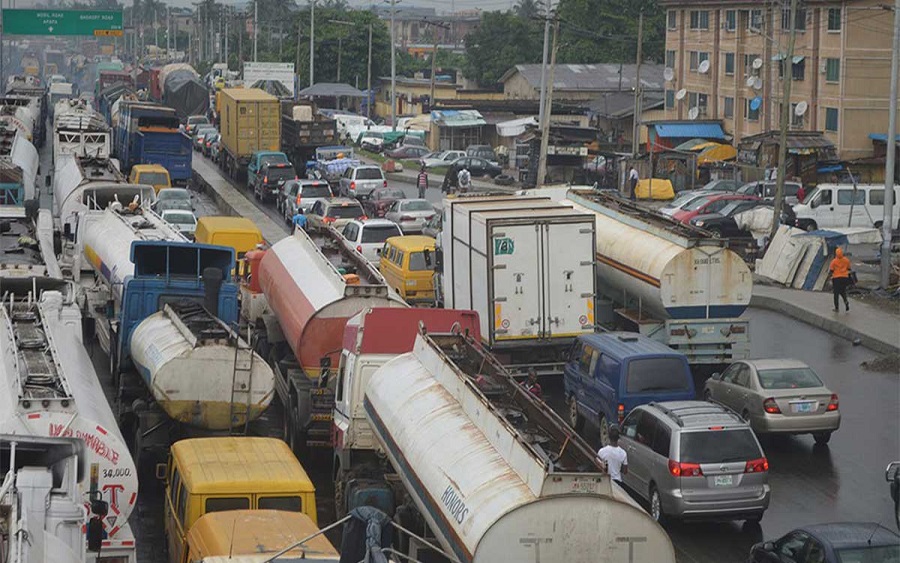The tightened gridlock at the Nigerian Ports has become severe to the point that it allegedly costs more than $4,000 to truck a container 20km to the Nigerian mainland in recent times.
This is according to a News report by Financial Times today tagged, “Nigeria’s port crisis: the $4,000 charge to carry goods across Lagos.”
READ: Haulage cost increases by more than 50% in a week as Apapa gridlock bites harder
The report, however, cements previous takes on the recent issues at the Port terminals, as well as the sporadic increase in detention and demurrage costs which were reported by Nairametrics four days ago.
The report revealed that the gridlock at the port terminals has become so devastating to the point that business entities pay more than $4,000 to truck a 40ft container 20km to the Nigerian mainland recently, almost as much as it costs to ship a container about 12,000 kilometres from China.
READ: Nigerians react as port haulage cost reportedly increases to N1.3 million
According to Shanghai Containerized Freight Index data provided by Dutch shipping consultancy, Dynamar,
- The average spot rate this year to ship a 20ft container from Shanghai to Lagos is about $3,000.
- While it costs about $3,750 to $4,000 for a 40ft container. However, the current spot rate is $5,000.
In this same vein, the impact of the gridlock extends beyond monetary costs, as freight companies and operators have to wait more than a month off the coast before they can offload their goods in the port – roughly how long they spend in transit to Lagos from China.
READ: Promoters of Badagry Deep Seaport are dragging FG to court; here’s why
What you should know
The gridlock has become a long-running crisis at the Apapa and Tin Can Island ports, which are the main commercial entry points into Nigeria, Africa’s largest economy.
The issues at the terminals, however, can be attributed to the weak state of the Country’s transport infrastructure as 90 per cent of cargo go by road.
READ: FG approves $3 billion Port Harcourt-Maiduguri railway and $462 million Bonny deep seaport
However, the increased sea traffic since the closure of the country’s land borders to combat smuggling last year, the pandemic-induced economic slump and the recent unrest in Nigeria’s commercial capital have exacerbated the current issues at the port, as dozens of ships remain idle at sea, while hundreds of empty trucks sit in traffic for days or weeks, owing to the lack of automation.
It is important to know that the port’s capacity has not increased since 1997, even as Lagos’s population has roughly tripled. Nigeria imports a lot of raw materials and almost all finished goods, and the congestion is causing production delays for multinationals.
READ: NPA expects 23 ships with petrol, food items, other commodities at Lagos Ports Complex
With the port area even more crowded at the busy year-end period, the Seaport Terminal Operators Association estimates that the congestion costs the country $55m a day in lost economic activity.
Steps taken to decongest the port terminals
The Managing Director of Nigerian Ports Authority (NPA), Hadiza Bala-Usman, disclosed that Trucks Park had been established in Orile, Lagos, to serve as a call-up centre for truck waiting to evacuate goods at the ports.
READ: Yemi Osinbajo launches Process Manual on Port Operations
This, with the implementation of the electronic call-up system, which had been put in place for the evacuation of goods by the Port Authority for trucks accessing the ports, are expected to play major roles to help decongest the Ports.
- Recently, Nairametrics reported that the Minister of Transportation, Mr Rotimi Amaechi, launched a new operation command centre built by terminal operator, APM Terminals Apapa, to boost efficiency and service delivery in the maritime industry.
However, government has embarked on other projects to beef up the country’s infrastructure in a bid to decongest the port, including Public-Private-Partnership arrangement to build deep seaports.
READ: FG to deploy 200 security officers to Apapa, Tin Can ports to clear gridlock
One of them includes the Akwa-Ibom Deep Seaport, another arrangement of this kind is located 60km east of Lagos, where the Singaporean food company, Tolaram, and China Harbour Engineering Company are building a $1.5bn deep seaport. But it is not expected to be completed until 2022.
READ: FG to launch Single window project, deploy scanners at seaports,
On-road infrastructure, one 35km stretch of road from the port is being refurbished by Nigerian billionaire, Aliko Dangote’s construction company, in return for a tax holiday. More companies are also using barges to move containers to bonded warehouses, where they can clear customs away from the port.
